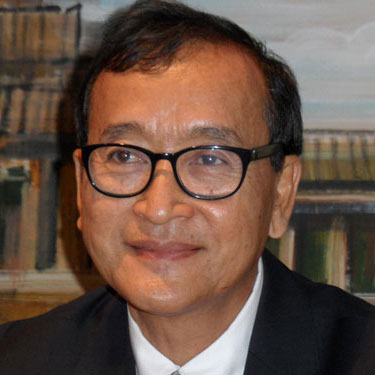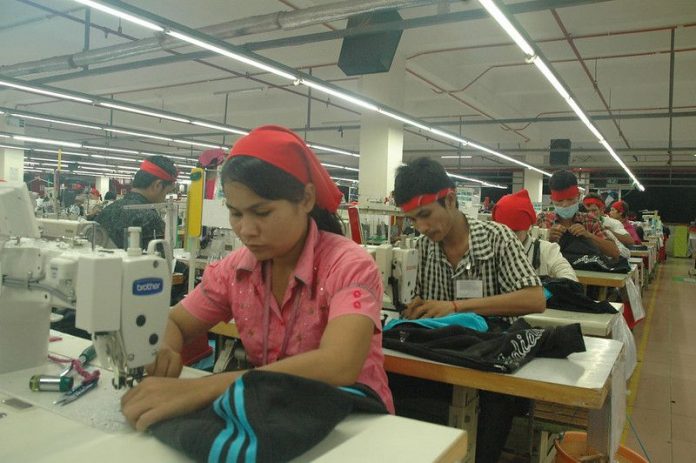The arrest of Cambodian Confederation of Unions president Rong Chhun betrays the narrowing options facing Prime Minister Hun Sen as the partial withdrawal of the country’s free-trade access to the European Union begins.
Rong Chhun was arrested by police on 31 July in Phnom Penh. The official reason is that he had been involved in protests against border encroachment by Vietnam. The real reason is Rong Chhun’s political credibility and his ability to mobilize workers in protest against the Hun Sen’s misguided policies.
In December 2018, Rong Chhun was convicted and given a suspended prison sentence for his role in protests in 2013 and 2014 in Phnom Penh calling for a higher minimum wage for informal workers. He was one of the members of Cambodia’s National Election Committee (NEC) nominated by the Cambodia National Rescue Party (CNRP). He resigned from the NEC in 2017, along with two other CNRP nominees, in protest at the arbitrary dissolution of the CNRP ordered by Hun Sen.
His standing and activities had become all the more dangerous to the regime in the context of the economic crisis triggered by the coronavirus pandemic. Shortly before his arrest, Rong Chhun had joined a group of more than 200 garment workers who gathered to submit a petition outside Hun Sen’s home to ask for his help after their factory was closed due to COVID-19. He had also written to the cabinet on July 1 urging the government to constructively respond to the EU’s criticisms on human rights and democracy.
Win-Win?
Cambodia now faces tariffs of up to 12% on exports to the EU including sugar, which has been particularly associated with land grabbing and human rights abuses, and some garment and footwear products. Tariffs will be levied on only about 20% of Cambodia’s EU exports, meaning the EU still has plenty of scope to impose further tariffs if there is no progress.
Hun Sen’s only response has been to sign a free-trade pact with China. The hollow nature of this agreement is betrayed by the fact that he is signing it on August 12 – the same day the withdrawal of EU trade preferences begins.
This is simply the politics of gesture rather than the implementation of an effective export strategy for Cambodia. The terms of trade with China are loaded in favour of Beijing. In 2018, Cambodia’s imports from China were worth $6.1 billion, while exports to China were worth just $1.3 billion.
Many Cambodian exports to China are already tariff-free due to its membership of the ASEAN-China Free Trade Area. The main Cambodian export to China, milled rice, won’t have tariffs fully removed for years. The truth is that China can supply itself with everything that Cambodia exports, especially low-cost garments. The agreement with Beijing does nothing to encourage the economic diversification that Cambodia needs to achieve. Buying more from Cambodia would simply put Chinese workers out of a job. Rather than an example of win-win strategy as proclaimed by the Cambodian government, the agreement is a case of “Heads China wins, Tails Cambodia loses.”
Hostage taking
The EU and the international community has learned about Hun Sen’s modus operandi the hard way. Political prisoners – more accurately hostages – are stacked up in the country’s jails. Selective releases – with the requirement to avoid political activity – are used occasionally to give the impression that concessions are being made.
It’s a well-worn, cynical tactic which won’t work anymore. Hun Sen needs to come up with something new. His trade agreement with China does not provide a way forward for his regime or his country. Yet he hesitates to turn back given the proven and enduring popularity of the banned CNRP. The trial of CNRP leader Kem Sokha on the fabricated charge of treason was already being dragged out for as long as possible before COVID-19. The trial remains indefinitely suspended, officially because of COVID-19. Yet casinos in Cambodia are being allowed to re-open, and not a single Cambodian death from the coronavirus has been reported.
An optimistic reading would be that Cambodia’s free trade agreement with China will allow Hun Sen to make concessions to the EU without losing face. Of course, the EU door is not closed. The EU stresses that it will restore full, free access to its market provided there is “substantial improvement” on human and labour rights.
The constraint is Hun Sen’s fear of walking through the door. Time is of the essence: rival low-cost exporters to the EU such as Bangladesh will not stand still and wait for him to make up his mind. The danger is that Cambodia will be permanently displaced from the EU markets on which it relied.
With COVID-19 looking likely to inflict lasting economic damage on Cambodia, the old bargain under which Hun Sen promised slowly rising living standards for some in return for silent obedience is over. The truth is that the survival of Hun Sen’s regime now depends on his being able to do the one thing which he has never been able to: admit that he was wrong and reinstate the CNRP.
The views and opinions expressed in this article are those of the author.

Sam Rainsy, Cambodia’s finance minister from 1993 to 1994, is the co-founder and acting leader of the opposition Cambodia National Rescue Party (CNRP).


